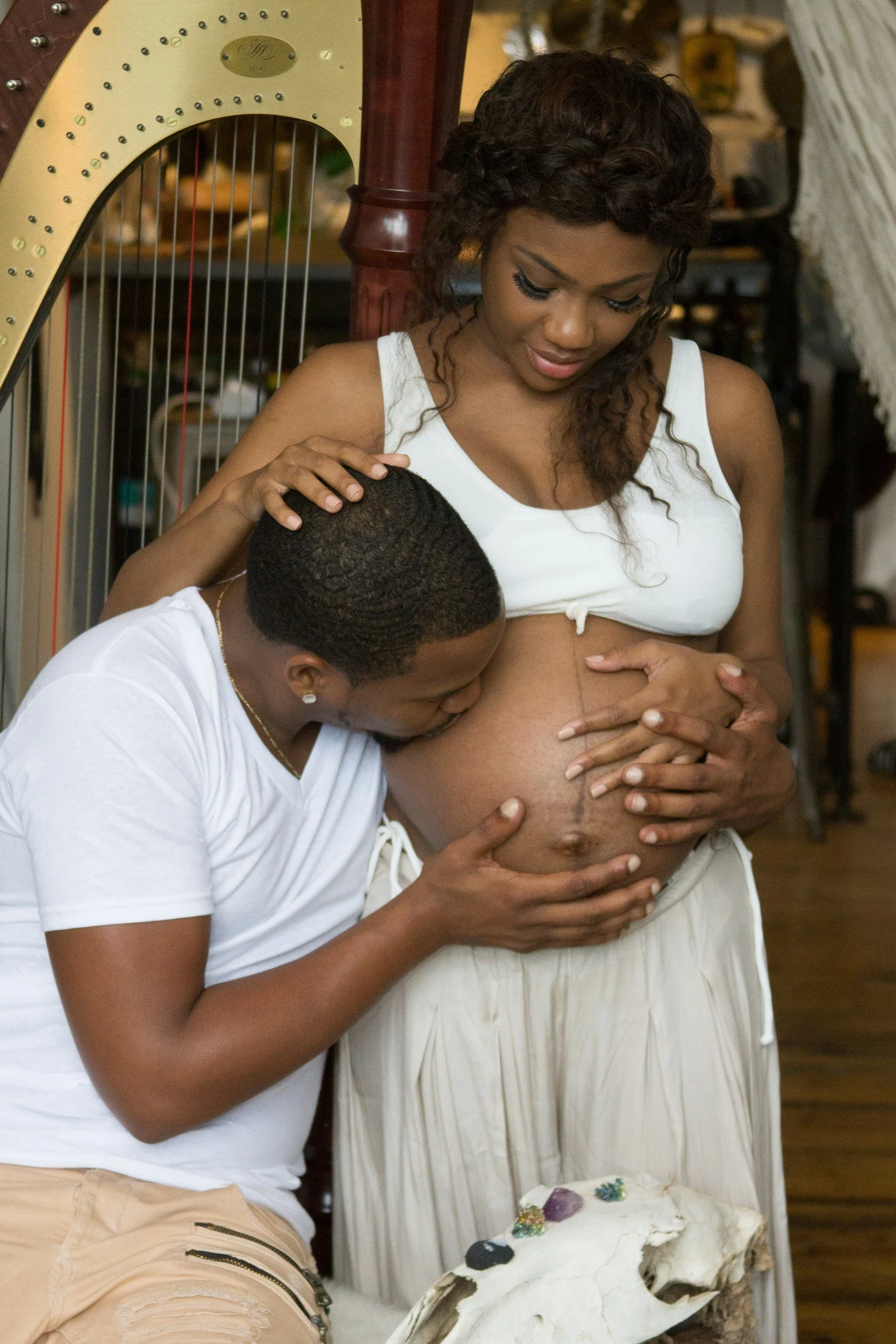
Compassionate Support from Fertility to Postpartum
Understanding the Emotional Landscape of Fertility, Pregnancy, and Postpartum
The journey to parenthood, while often anticipated with immense hope and joy, can also involve feelings of anxiety, fear, and uncertainty. It is not always about a single, dramatic event, but it's about all the experiences that happen during fertility treatments, pregnancy, or postpartum that can feel overwhelming, challenging, or beyond your control. These impactful experiences can range from:
Helplessness or Loss of Control: This can stem from the medical intensity of fertility treatments, unexpected complications during pregnancy, or feeling lost in the postpartum haze of sleep deprivation and newborn care.
Fear for Yourself or Your Baby's Well-being: A profound concern for your own health or your baby's health can arise at any time during this period from routine medical procedures, unforeseen complications, or any discomfort in your body during fertility, pregnancy, or postpartum recovery.
Breach of Trust or Disregard: Experiences where you felt medical professionals were dismissive, coercive, or your boundaries were disrespected can be deeply unsettling, impacting your sense of autonomy and dignity during this vulnerable period.
Extreme Pain or Overwhelming Interventions: Unmanaged or excruciating pain through fertility, pregnancy, and postpartum, especially when combined with a feeling powerless or unheard by medical professionals, can feel dehumanizing and frustrating.
Disconnection or Detachment: Feeling disconnected from your body or even your baby during this time can be a protective mechanism when times are stressful, but it can also impact your ability to bond and connect with yourself, your partner, and your baby.
Grief and Disappointment: The profound sorrow that arises when a fertility journey ends unexpectedly, a pregnancy doesn't progress as expected, or a birth experience deviates drastically from expectations can lead to feelings of loss, unfulfillment, or confusion.
Lack of Support or Isolation: Feeling alone, unheard, or unsupported by healthcare providers, your partner, or your social network can lead to resentment, anger, and even betrayal at not receiving the support you thought you would get when starting to build a family.
Witnessing Distress: For partners, seeing a loved one in distress or experiencing complications can make you feel powerless and feel out of your control unable to solve or fix the situation.
The enduring influence of these experiences can manifest in various ways. You might experience intrusive thoughts or vivid memories related to challenging moments, or an intense urge to avoid anything that reminds you of the experience – whether it's medical settings, conversations about conception, pregnancies of those around you, or even thoughts of future pregnancies. You may notice heightened anxiety and feeling on edge, such as being constantly restless, irritable, experiencing panic-like sensations, having difficulty sleeping, or even heightened vigilance for your baby's safety.
Additionally, these experiences can lead to emotional fluctuations, manifesting as intense mood swings, overwhelming sadness, persistent anger, or feelings of numbness and detachment. Many parents report difficulties with bonding and attachment to their baby, experiencing guilt over these feelings, or struggling to find joy in parenthood that they were expecting. Relationships can also suffer, with relationship strain leading to challenges in intimacy, communication difficulties, or feeling profoundly misunderstood. You might also experience physical symptoms like chronic tension, unexplained pain, or other bodily manifestations of unresolved stress and emotional overwhelm. Recognizing these signs is the crucial first step toward acknowledging your experience and opening the door to healing and finding greater well-being.
Fertility Support: Cultivating Hope and Resilience on Your Path to Conception
The desire to build a family is a deeply personal and often emotionally journey. For many, the path to conception is not linear, and facing fertility challenges can bring a unique blend of hope, uncertainty, and profound grief. As your therapist, I am here to provide a confidential and empathetic space to process these complex emotions and cultivate resilience.
I understand the immense emotional landscape of fertility journeys, whether you are just beginning to explore options, undergoing assisted reproductive technologies, or navigating decisions about alternative paths to parenthood. My support is tailored to your individual experience, acknowledging the unique emotional and psychological impact of this time.
How I Can Support You Through Fertility:
Emotional Processing: I offer a space to acknowledge and process the wide spectrum of feelings that arise during fertility treatments, from excitement and anticipation to disappointment, anxiety, or sadness. I use psychodynamic therapy to help uncover those feelings in order to process them and express them in healthy ways.
Stress Management: I guide you through evidence-based techniques to manage stress, reduce anxiety, and promote emotional well-being, helping you feel more grounded amidst the uncertainty of your fertility journey through somatic therapy.
Coping Strategies: We will work together to develop healthy coping mechanisms for setbacks, waiting periods, and the emotional fluctuations inherent in this journey. I help you find ways to focus on the areas of the process you can control versus ones you cannot control.
Navigating Relationships: Fertility challenges can impact partnerships and family dynamics. I can help you strengthen communication, navigate difficult conversations, and ensure your support system can help ease the stress and strain of the process.
Grief and Loss: Should you experience pregnancy loss or unsuccessful treatments, I provide compassionate support for processing grief and navigating the path toward healing.
Identity and Self-Compassion: We can explore shifts in identity, self-worth, and foster self-compassion by helping you through cognitive behavioral therapy (CBT) to reframe any negative thoughts towards more positive thoughts.
During your fertility journey with me, I will be a support walking next to you through the ups and downs of the process. The tools and resources will help you cope with the uncertainty of the process. This will allow you to sustain your energy and focus towards building the family you dream of having.
Pregnancy Support: Nurturing Your Well-being Through Anticipation and Change
Pregnancy is a period of extraordinary transformation, both physically and emotionally. While often considered as a time of pure joy, it can also be a time of new anxieties, physical discomforts, identity shifts, and a multitude of feelings that are not always talked about or even acknowledged. As mothers, we are told to only express the joyful feelings of pregnancy and not express our challenges, which are seen as being ungrateful. My support during pregnancy focuses on nurturing your mental and emotional well-being, helping you navigate this profound transition with greater calm and confidence- allowing you to express all the range of feelings in a safe and accepting space.
I recognize that every pregnancy is different – whether it’s your first, a subsequent one, a high-risk pregnancy, or a rainbow baby after loss. My approach is never one-size-fits-all; instead, I attune to your specific needs, concerns, and hopes during this unique time.
How I Can Support You During Pregnancy:
Managing Pregnancy-Related Anxiety: It’s common to feel anxious about labor, delivery, changes to your body, or the impending responsibilities of parenthood. I can help you develop strategies to manage these anxieties and cultivate a sense of calm.
Navigating Identity Shifts: The transition to becoming a parent, or expanding your family, involves significant identity shifts. We can explore these changes, validate your feelings, and help you integrate into new roles.
Emotional Preparedness for Parenthood: Beyond physical preparations, preparing mentally and emotionally for a baby is crucial. We can discuss your expectations, fears, and hopes for parenthood, fostering a sense of readiness by creating plan to address these concerns to use once baby arrives.
Processing Past Experiences: Previous losses, traumatic experiences, or difficult childhoods can sometimes surface during pregnancy. My approach through psychodynamic therapy can provide a safe space to process these past experiences and prevent them from impacting your present well-being.
Body Image and Self-Compassion: Pregnancy brings rapid and significant changes to your body. I can support you in developing a positive body image and cultivating self-compassion throughout this period through somatic therapy to keep you attuned and connected to your body and your baby.
Building a Support System: We can explore ways to strengthen your existing relationships and identify additional support networks to ensure you feel well-resourced for the journey ahead.
Through our sessions, I aim to equip you with emotional tools and strategies that not only support you throughout your pregnancy but also lay a strong foundation for a confident and connected transition into the postpartum period.
Postpartum Support: Embracing the Fourth Trimester with Compassion
The postpartum period, often referred to as the "fourth trimester," is a unique and often overwhelming time of adjustment. While much focus is placed on the newborn, the birthing parent's physical and emotional recovery is equally as important, and often overlooked. My postpartum support is designed to provide you with the dedicated care you need to navigate this demanding yet beautiful phase of life.
I understand that the postpartum experience is highly individual – there's no single narrative for what it "should" feel like. Whether you're navigating hormonal shifts, sleep deprivation, feeding challenges, body image concerns, or the intense emotional landscape of new parenthood, I offer a compassionate and non-judgmental space to explore your feelings and develop healthy coping strategies.
How I Can Support You During Postpartum:
Processing Birth Experiences: Regardless of how your birth unfolded, processing the experience is crucial for emotional healing. I provide a safe space to discuss your birth story, whether it was empowering, challenging, or traumatic and helping you reconnect with your body to feel safe and connected through somatic therapy.
Navigating Hormonal Shifts and Mood Fluctuations: The rapid hormonal changes after birth can significantly impact your mood. We can explore strategies for managing the "baby blues" and identifying signs of more persistent mood and anxiety disorders.
Addressing Postpartum Mood and Anxiety Disorders (PMADs): If you are experiencing symptoms of postpartum depression and anxiety, I help you recognize symptoms, develop coping strategies, and access additional resources if needed. My focus is on empowering you through this challenging time.
Identity Re-formation: Becoming a parent leads to shifts your identity. We will explore how your sense of self is changing, helping you integrate your new role while honoring who you were before.
Sleep Deprivation and Self-Care: I will help you implement realistic strategies for managing sleep deprivation and prioritizing essential self-care amidst the demands of a newborn. These self-care activities can help you not only survive the sleep deprivation, but even find glimmers of joy with your newborn.
Body Image and Healing: The postpartum body undergoes significant changes. I offer support for cultivating body acceptance and self-compassion as you heal. Using various techniques I can help reframe those negative self talk about your body towards expressing appreciation at your body’s ability to grow, birth, and sustain your baby.
Relationship Adjustments: Parenthood impacts partnerships. We can explore communication strategies and ways to maintain connection and intimacy amidst new responsibilities.
My goal for you during your postpartum journey is to address your struggles to reduce their impact in order for you to be able to connect and bond with your baby. While the postpartum period is difficult, it should not take away from you ability to find joy with your baby. Blending different therapeutic techniques, to fit your unique needs, I will help you grow in confidence as a parent.



